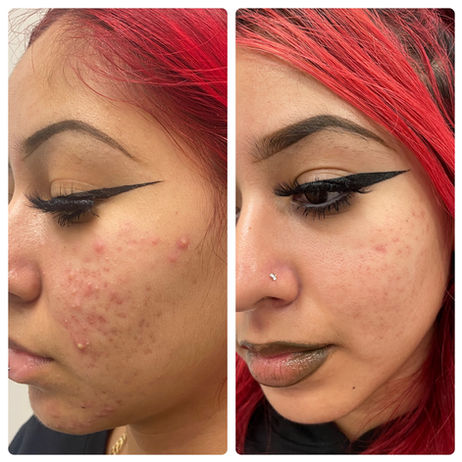Acne & Acne Scars
Looking to get rid of troublesome acne & acne scars for good? Learn about our acne treatment options, offered in our Beverly Hills office.

What is acne?
Acne, also known as acne vulgaris or “common acne,” is given its name because it is a very common skin disorder, affecting approximately 85% of young people. It usually begins at puberty but can also occur in babies and older adults. It occurs when hair follicles fill with oil and dead skin cells, which causes an inflammatory reaction. If severe enough and left untreated, acne can lead to acne scars. Acne can range from comedones or “blackheads and whiteheads” to the more severe form, nodules and cysts.
What causes acne?
There is a genetic predisposition so you should be more proactive if you have siblings or parents with a history of acne. It can also be triggered by lifestyle factors such as food choices or stress.
How do you treat acne?
We specialize in treating acne of all ages with all skin types. We offer a variety of topical medications, laser treatments, chemical peels, and light therapy to improve acne and acne scars. For our patients that prefer to avoid any medications, we adopt a moreholistic but equally effective approach by utilizing state-of-the-art lasers and light therapy, which have zero downtime. Treatment regimens are always tailored to the individual to deliver personalized results.
Schedule a Consultation Today
Acne and Acne Scar Treatment Videos: Laser Treatments & Chemical Peels
See some of our popular treatment options in action including Vbeam laser and chemical peels!
Set Up an Appointment with Us
Are there types of acne?
Acne is a common skin condition that can cause blemishes on the face, chest, back, and shoulders. Acne is caused by the skin pores becoming blocked by hair, sebum (an oily substance), bacteria and dead skin cells. Those blockages produce blackheads, whiteheads, nodules and other types of pimples. Acne can be triggered by a variety of causes including genetics, hormones, stress, changes in weather, and use of certain products. While many people think of acne as affecting teenagers, it affects people of all ages.
Acne can be classified in different ways.
Whiteheads- these are small bumps that are white or flesh colored. Whiteheads occur when pores become clogged with excess oil, bacteria, and dead skin cells.
Blackheads-there are small bumps that appear black in color. When your pores fill with debris but stays open, you’ll see a blackhead.
Topical medications including creams and washes are able to treat these. We also are able to treat these with extractions and LASERs.
Pustules- these contain a yellowish fluid, often with a white-colored center.
Nodular acne- nodules occur when clogged, swollen pores endure further irritation and grow larger, these are deeper underneath the skin. These are deep within the skin and often scar.
Cystic acne- cysts can develop when pores are clogged by a combination of bacteria, sebum, and dead skin cells. These are deep within the skin and often scar.
These types of acne penetrate deep into the skin, and can cause permanent acne scars when they heal. The sooner you start treatment, the fewer permanent scars you’ll have. Treatment options include various lasers, chemical peels, and photodynamic therapy. Newman Dermatology offers laser options for all skin types. Ask us about the right treatment option for your skin.
How do you treat acne scars?
Acne scars can be very difficult to treat, but don't worry, we have the best options available for you! We have specialized lasers, such as Vbeam, which targets redness and also helps smoothen scars caused by acne. We also can perform various types of chemical peels which cause micro-traumas to the top layers of your skin and allow new layers of skin and collagen to form. Another option is collagen stimulating solution, which similarly causes targeted micro-traumas to the surface of the skin and promotes collagen growth. Contact our office to find the best option for your skin.
What is a keloid?
A keloid is a type of raised scar that occurs where the skin has healed after an injury. Unlike regular scars, keloids are larger, extend beyond the boundaries of the original wound, and can continue to grow over time. They are formed when the body produces excess collagen during the healing process. Keloids can be reddish, purplish, or darker than the surrounding skin, and they are usually smooth, firm, and shiny.
Keloids can develop after various types of skin injuries, including cuts, burns, surgical incisions, piercings, acne, or even minor scratches. While they are not harmful, they can be itchy, tender, and may cause discomfort or emotional distress due to their appearance.
Treatment options for keloids include corticosteroid injections, laser therapy, cryotherapy (freezing), surgery, silicone sheets, or pressure therapy. However, keloids can be challenging to treat, and sometimes they may recur after treatment.





